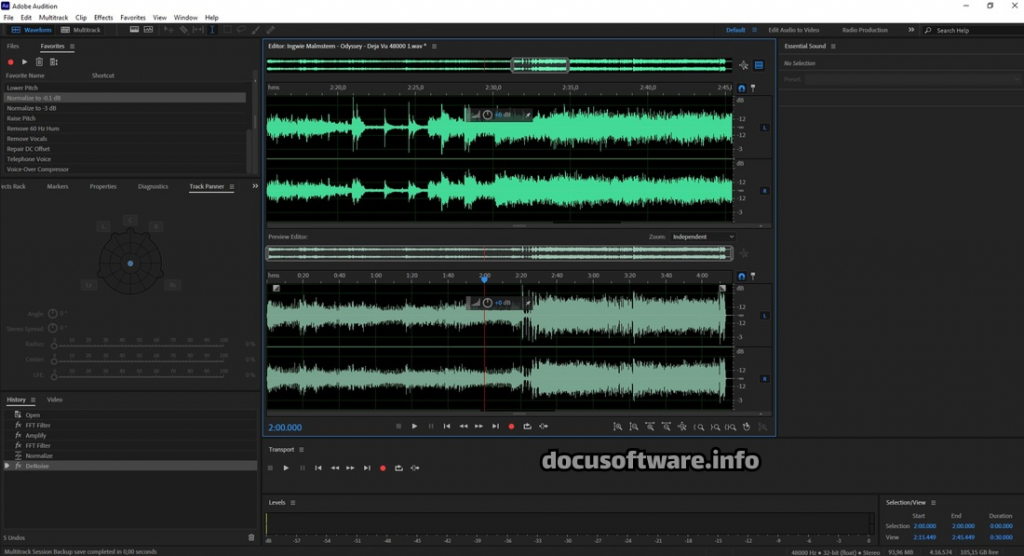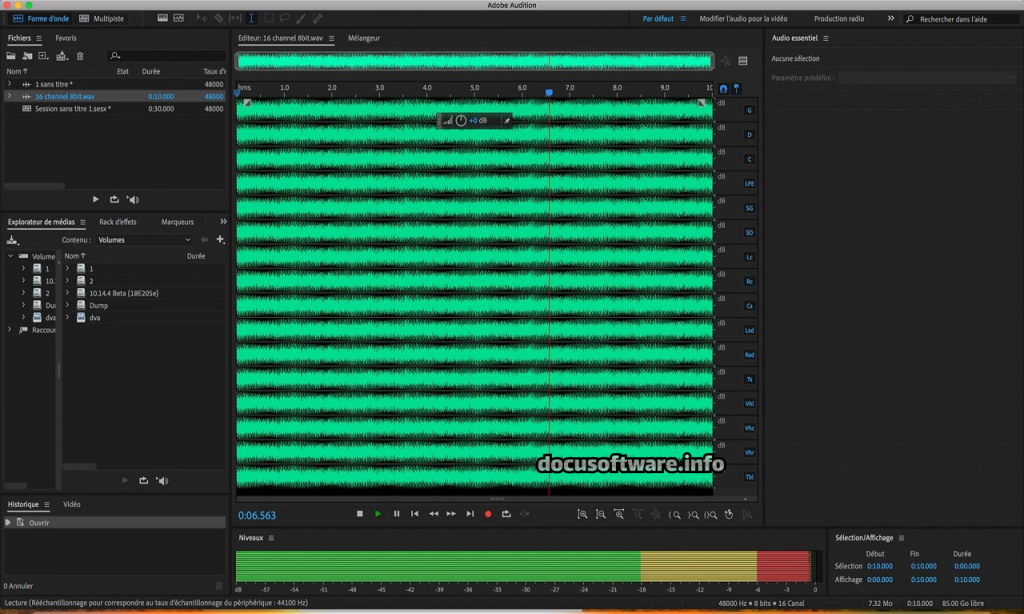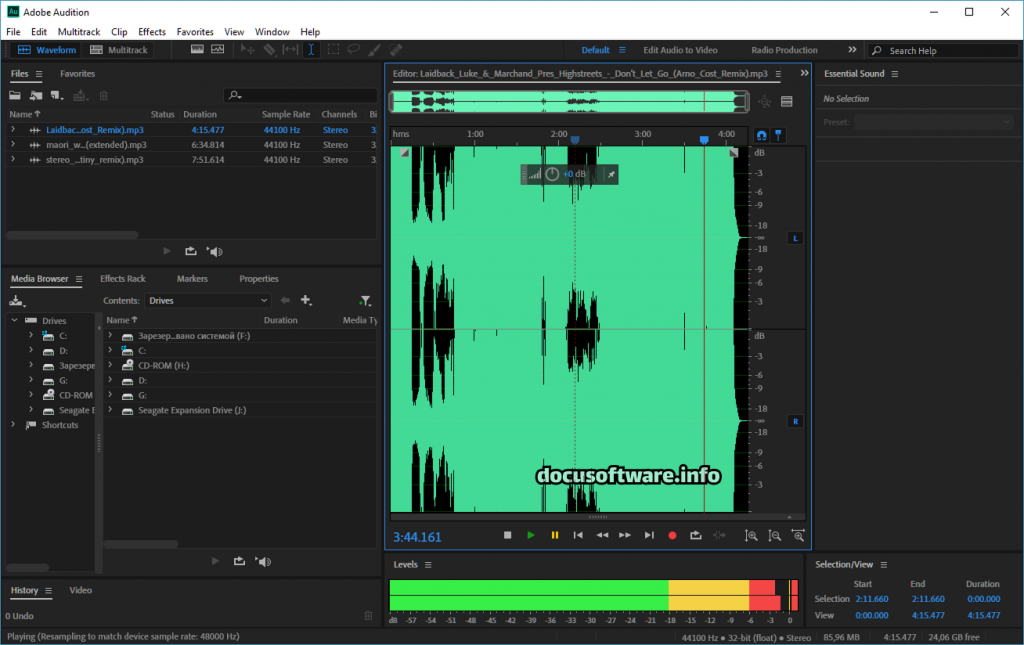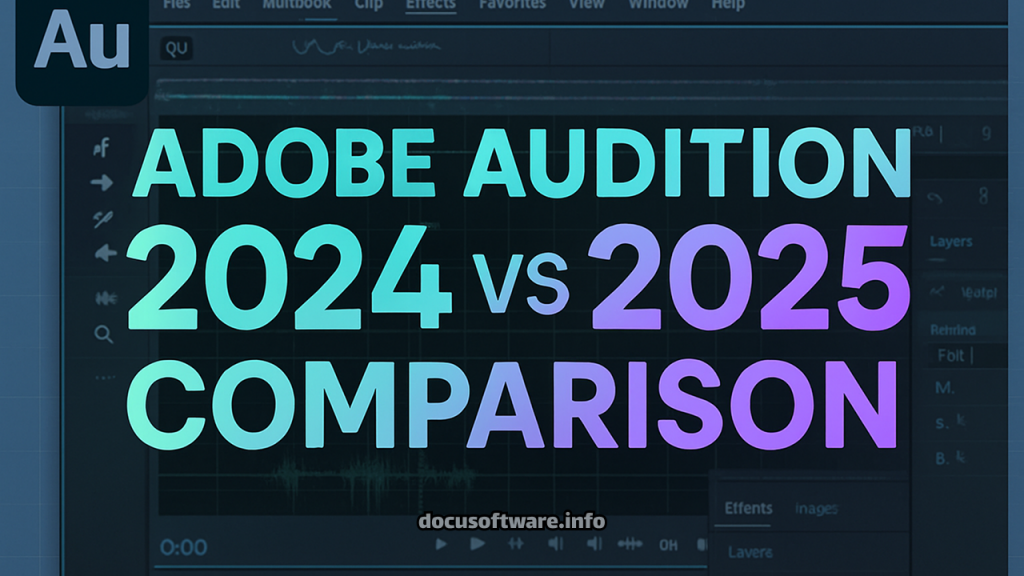Introduction: Understanding the Evolution of Professional Audio Editing
Adobe Audition continues to dominate the professional audio editing landscape, serving podcasters, video editors, sound designers, and music producers worldwide. This comprehensive comparison between Adobe Audition 2024 (version 24.x) and Adobe Audition 2025 (version 25.x) explores the nuanced differences, performance improvements, and workflow enhancements that matter most to audio professionals.
Whether you’re considering an upgrade or evaluating which version best suits your production needs, this detailed analysis provides real-world insights and technical specifications to inform your decision.
Core Version Overview and Release Timeline
Adobe Audition 2024 (Version 24.x)
Released in October 2023, Adobe Audition 2024 introduced significant workflow improvements and AI-powered features that revolutionized audio post-production. The version 24.x series continued through updates 24.4 (May 2024) and 24.6, each bringing stability improvements and refined functionality.
Adobe Audition 2025 (Version 25.x)
Launched in October 2024, Adobe Audition 2025 represents a mature evolution rather than a revolutionary leap. The current version 25.3 (June 2025 release) focuses on stability, performance optimization, and workflow refinements based on user feedback from the 2024 version.

Key Feature Comparison: What’s Changed Between Versions
Performance and Processing Speed
Adobe Audition 2024:
- Standard multicore processor optimization
- Real-time effects processing with moderate CPU usage
- Render times baseline for comparison
- 30% faster render times compared to the previous version due to optimized CPU efficiency
- Enhanced multicore threading for complex projects
- Improved memory management for large multitrack sessions
- More responsive interface during heavy processing tasks
AI-Powered Audio Enhancement Tools
Adobe Audition 2024:
- Introduced AI Noise Removal technology
- Basic auto-ducking capabilities
- Initial implementation of intelligent audio restoration
Adobe Audition 2025:
- AI-powered auto-ducking for background music
- Enhanced noise reduction algorithms with better preservation of voice characteristics
- AI-generated transcription and voice isolation for clear dialogue
- Improved spectral frequency display accuracy for surgical editing
User Interface and Workspace Customization
Adobe Audition 2024:
- Dark mode interface as standard
- Fixed brightness levels across panels
- Traditional workspace layouts
Adobe Audition 2025:
- Adjustable brightness controls for panels, windows, and dialog boxes with consistent brightness throughout the application
- Support for light mode themes (introduced in version 25.2)
- More flexible workspace customization options
- Refined visual hierarchy for improved navigation
Multitrack Editing Capabilities
Adobe Audition 2024:
- Session markers with basic functionality
- Standard clip editing tools
- Traditional effects routing
Adobe Audition 2025:
- Enhanced Session Markers and Clip Markers for Multitrack with ability to add, edit, and move clip markers in multitrack mode
- Copy and paste effects from one track to another in both Waveform and Multitrack modes
- Improved track organization and management
- Better visual feedback during multitrack operations
Playback and Monitoring Features
Adobe Audition 2024:
- Standard playback speed controls
- Basic monitoring options
Adobe Audition 2025:
- Variable playback speeds including 1.1x, 1.2x, and custom rates
- Enhanced monitoring capabilities for real-time analysis
- Improved scrubbing accuracy for precise editing

Technical Specifications and System Requirements
Minimum System Requirements Comparison
Adobe Audition 2024:
- Windows 10 v1703 or higher / macOS 10.14 or later
- 4 GB RAM (8 GB recommended)
- 4 GB available hard disk space
- 1920×1080 display resolution recommended
- Multicore processor with 64-bit support
Adobe Audition 2025:
- Windows 11 or Windows 10 v1909 or higher / macOS 11.0 or later
- 8 GB RAM minimum (16 GB recommended for complex projects)
- 4 GB available hard disk space
- 1920×1080 or larger display resolution
- Multicore processor with 64-bit support and AVX2 instruction set
Workflow Integration and Creative Cloud Ecosystem
Adobe Audition 2024:
- Basic Creative Cloud integration
- Standard Premiere Pro workflow
- Manual asset management
Adobe Audition 2025:
- Seamless Creative Cloud Libraries integration
- Enhanced Premiere Pro round-trip editing
- Improved After Effects compatibility
- Cloud document support for collaborative projects
- Better integration with Adobe Stock audio assets
Pricing and Subscription Models
Both versions follow Adobe’s Creative Cloud subscription model:
- Individual Plan: $34.99/month (includes Audition only)
- Creative Cloud All Apps: $59.99/month (includes entire Adobe suite)
- Educational Discount: Up to 60% off for students and teachers
- Business Plans: Custom pricing for teams and enterprises
Note: Adobe Audition 2025 is included in all current Creative Cloud subscriptions at no additional cost for existing subscribers.
Bug Fixes and Stability Improvements
Issues Resolved in Adobe Audition 2025:
- Fixed alert message visibility in multi-track projects
- Resolved MP3 export silence issues at beginning and end of files
- Corrected waveform display when deleting audio content
- Improved CD burning and extraction stability
- Enhanced VST3 plugin compatibility
Professional Use Cases and Industry Applications
Podcast Production
Adobe Audition 2025 excels in podcast workflows with its new adaptive EQ settings specifically designed for podcast production, making it easier to achieve broadcast-quality sound without extensive audio engineering knowledge.
Video Post-Production
The improved integration with Premiere Pro and After Effects in version 2025 streamlines video audio workflows, particularly for content creators working across multiple Adobe applications.
Music Production and Mixing
While both versions support comprehensive multitrack mixing, the 2025 version’s performance improvements significantly benefit complex music projects with numerous tracks and effects chains.

Migration Considerations: Should You Upgrade?
Upgrade to Adobe Audition 2025 if you:
- Work with large multitrack sessions requiring optimal performance
- Need the latest AI-powered audio restoration tools
- Collaborate frequently using Creative Cloud features
- Require the most stable version with all known bugs fixed
- Want customizable interface brightness for extended editing sessions
Stay with Adobe Audition 2024 if you:
- Have established workflows that meet your current needs
- Use third-party plugins that haven’t been tested with version 25
- Work primarily on simple audio editing tasks
- Have system specifications that barely meet 2024 requirements
Future Development and Roadmap
Adobe’s commitment to regular updates ensures both versions receive security patches and critical fixes. However, new feature development focuses exclusively on the 2025 version, with the June 2025 release (25.3) being the latest update focused on stability rather than new features.
Conclusion: Making the Right Choice for Your Audio Production Needs
The transition from Adobe Audition 2024 to 2025 represents a refinement of an already powerful digital audio workstation. While the core functionality remains consistent, the 2025 version offers meaningful improvements in performance, stability, and workflow efficiency that justify the upgrade for professional users.
The 30% improvement in render times alone can significantly impact productivity for studios handling multiple projects. Combined with enhanced AI features, improved Creative Cloud integration, and refined user interface options, Adobe Audition 2025 positions itself as the superior choice for serious audio professionals.
However, Adobe Audition 2024 remains a capable and stable platform that continues to serve thousands of users effectively. The decision ultimately depends on your specific workflow requirements, hardware capabilities, and integration needs within the broader Creative Cloud ecosystem.
